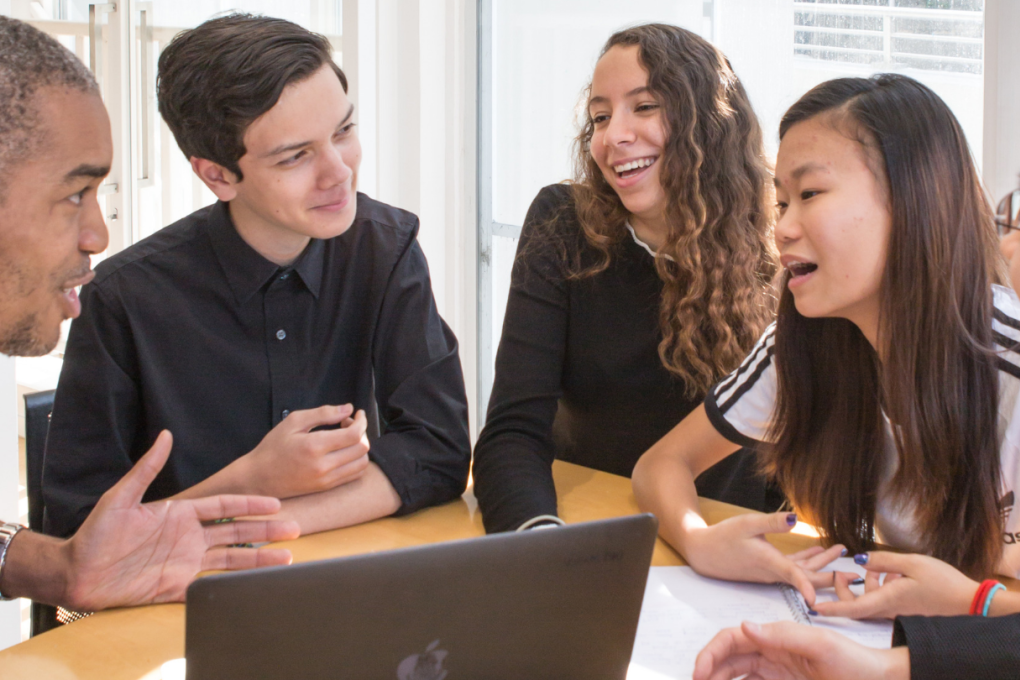Developing Passion and Purpose

[Sponsored Article]
A popular quip across The Harbour School’s campuses is that being a student at THS is a bit like being a regular at Cheers - everybody knows your name. This reality is not only a product of being a small community with low student to teacher ratios, it is also indicative of the organization’s belief that the best educational programs engage students on an individual level.
In a world where information is so readily accessible, the value proposition of brick and mortar schools must extend beyond knowledge transfer to generating educational experiences that help students access and leverage their talents and interests toward future goals. The call is to do more than inform or instruct. But how can one facilitate individualized programs in settings traditionally set up to mass produce experiences?
Plenty of emphasis is given in workplace literature to the value of engaging in work that is personally meaningful, yet very little about traditional schooling models concerns itself with generating experiences that tap into what motivates students - that is, what genuine purpose does or could drive them to examine a topic or field of study in a genuine, in-depth way and make them want to take ownership. At THS, heavy emphasis is put on understanding what passions motivate students and tapping into those to produce an educational experience that is both memorable and relevant to their lives right now and those they hope to lead.
When designing courses, teachers at the high school collect tangible data around students’ topical preferences to embed in the class design. Believing that individuals learn more when their interests and sense of purpose are engaged, the staff surveys their target audience. In a recent survey, for example, students expressed interest in courses related to cooking, psychology, engineering, and European history. The subsequent course catalog included classes entitled Food Chemistry, Adolescent Psychology, Physics and Engineering, and The Defense Disappears - a class on the history of Europe during World War II.
The modularized, integrated curriculum at THS lends itself to developing courses which leverage students interests - ones often derived from the careers and studies they hope to pursue. It is an environment that seeks to know students at an individual level and adapt even core functions like curriculum planning to the specific needs of the students who are actually there - not the average population. The underlying assumption being that individuals who are more engaged in and take greater ownership of their learning will be more successful at it.
In addition to generating classroom content that taps into community interests, all high school students are required to complete an Independent Study Module (ISM) each academic year. Their ISMs amount to a self-designed course around a topic of specific interest to them. They are asked in the first term to conduct in-depth, scaffolded research on an area that they are interested in at either the academic, career, or hobby level.
In the second term, after honing the parameters of their project, students apply their research in venues ranging from volunteer initiatives to internships before generating their own presentations and exhibitions in the third term. Schools are increasingly building independent or senior projects into their curriculum but often they are not as self-directed as they purport to be, with students being fundamentally limited to a set of topics or approaches dictated by the appraising teacher.
At THS, ISMs range in topic from boat building and the jewelry business to neuroscience and robotics. They truly embody the aspirations and interests of the students that generate them and are often parlayed into college portfolios or used as launchpads for career pursuits. Core to the ISM experience is the mentorship and support of THS’ ISM coordinator and the academic advisors assigned to each student.
One of the benefits of operating in a small community is that students become known entities. As the coordinator and advisors work alongside students in developing their ISMs, critical data about population interests and preferences is gathered and fed back into the larger organizational system. Students come to feel invested in - that their ideas and preferences are not only acknowledged but incorporated into their larger educational experience. This, in turn, stimulates greater investment in and commitment to their academic program.
Furthermore, there is a level of vulnerability that comes with putting one’s personal passions on display. The best ISMs are the ones that give students an authentic glimpse at what pursuing a particular interest would look like in college or beyond. They are as effective at ruling out potential career path as they are at affirming them. The risky process of attempting to define, shape, and reshape their future is accompanied by the cultivation of deep relationships with the mentors who support them.
No matter how different and diverse each individual student’s background and characteristics might be, THS’s equitable school culture embraces the uniqueness, strengths, and challenges of the student and provides equitable support, understanding, expectations, and encouragement to succeed. Equity can only occur in a school culture where it is safe for students and faculty alike to take risks, stretch, learn, and authentically engage day in, day out. And this is what THS provides.
About Dr. Elizabeth Micci, THS High School Principal
Dr. Elizabeth Micci joined The Harbour School in 2017 as a researcher and a member of the high school humanities faculty while completing her Doctorate of Education Leadership from the Harvard Graduate School of Education. Upon completion of her program, she became the High School Principal at the Garden Campus. She also holds a Bachelor of Science in Business Administration and English from Washington & Lee University and a Master of Arts in English from Middlebury College. Prior to joining The Harbour School, Dr. Micci was a high school English teacher and administrator of a college prep academy in Houston, TX.